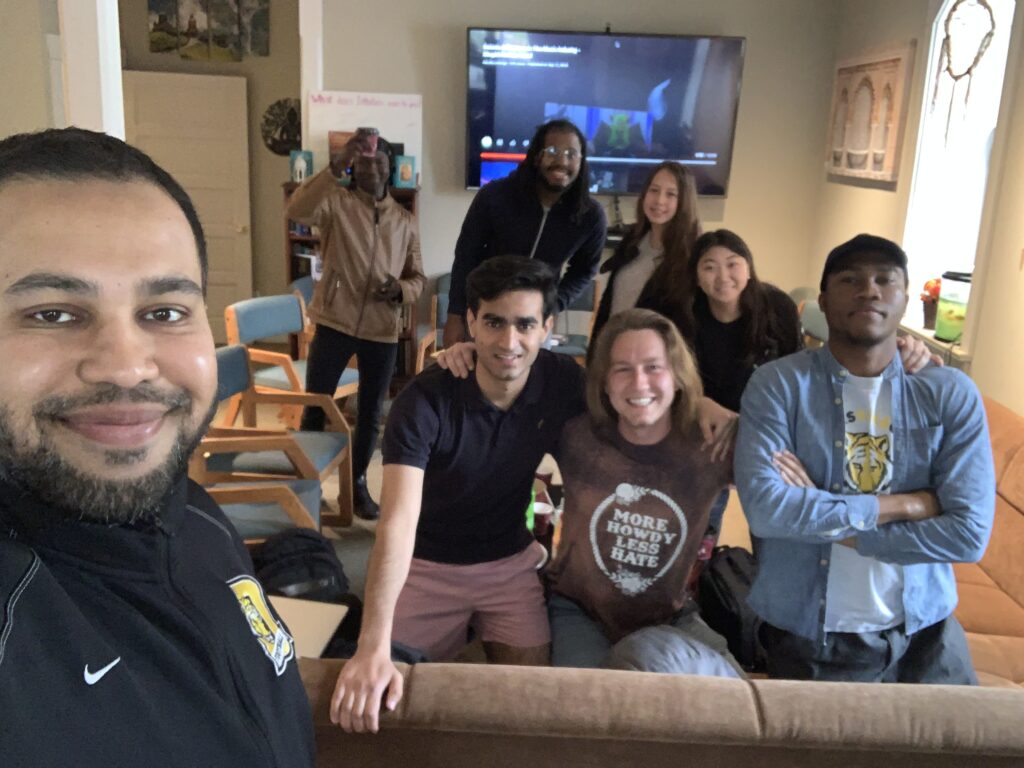An institution’s academic ranking isn’t the most important criterion

By Sami Abdul Aziz
September/October 2022
Having been a university chaplain at universities nationwide, I’ve known students on an in-depth level and observed them trying to be Muslim in a very non-Muslim environment.
While living in the U.S. has its challenges, parents can often check out more easily from the workplace social pressures than their children can from school or workplace social pressures. Often immigrant parents’ brains having been developed in a homogeneous society, have had their personalities and behaviors already set by years of living in an Islamic environment. Their children’s brains continue to form in whatever environment they are living in as it is impacted by the intense social programming bombarding them from multiple sources including their non-Muslim and statistically increasingly atheistic environments. We are no longer living in a “Christian” country dictated by some Biblical-based laws. but in a predominantly secular country based upon what people feel is right. This might result in cognitive dissonance, meaning that they’re confronted almost daily with non- or unIslamic ideas, philosophies and worldviews. For example, teachers often assign readings or express ideas that promote sexual promiscuity as good and as a lifestyle that people should not only support, but also consider for themselves.
An even deeper-rooted and overlooked issue is the disconnection of modern science and the Islamic sciences in our schools. The brain’s connection, therefore, separates the two: the former as real and the latter as magical, mystical or fake. Science is here and now; God is far away. Science is modern; God is ancient. Self-help books deal with today’s issues; the Quran is old knowledge for a long-ago time. Considering these situations, I’d like to help you and your families formulate your higher education pathways.
My advice is as follows. A college or a university’s high academic ranking doesn’t guarantee a more successful career. Having a higher moral and religious grounding, however, does have a positive impact on determining the student’s career success. It’s less about the university ranking and more about staying in the fight when things get tough. A study out of Boston University found Muslim students who attended Islamic schools to be more confident and faithful. In America and elsewhere, Glenn says, research suggests “kids who attend faith-based schools are less alienated from their society than kids who attend public schools, where they feel part of a singled-out minority.” Brian Kelly, editor of the U.S. News & World Report’s “Best Colleges” (Aug. 26, 2014), admitted that the rankings system can be gamed, at least in Boston. Alexandru Pop’s (Jan. 18) “5 Reasons Why University Rankings Are Not Perfect” is also very informative.
Unfortunately, our society’s rapid movement away from religion means that data points aren’t focused on religion as a benefit as much as is the case with exercise, psychology or medication. Counselors and schools often give a whole host of solutions outside of religion. However, there is a way to select Muslim-friendly universities.
Muslim parents and students need to consider the difficulties of university life. Here are 10 tips to help when choosing a university:
• Check the MSA or Muslim Club’s online social media presence. Look for photos showing practicing Muslims. Does it look like a social club or a place for spiritual rejuvenation? When was their last post? Do they have a board? Does it look like a community your children could learn from and into? Try reaching out to have one-on-one meetings with board members to see if this is a good fit for your child. Successful MSA chapters have weekly meetings for both the executive board and the general body.
“Those who hearken to their Lord and establish regular prayer; who (conduct) their affairs by mutual consultation among themselves; who spend out of what We bestow on them for Sustenance” (2:233).
“Thus it is due to God’s Mercy that you deal with them gently, and had you been rough, hard hearted, they would certainly have dispersed from around you; pardon them therefore and ask pardon for them, and take counsel with them in the affair; so when you have decided, then place your trust in God; surely God loves those who trust” (3:159).
• Check the university’s religious/spiritual life page. Do they list an on-campus Muslim chaplain? This chaplain should be qualified and exclusive. To save money, universities will try to combine an existing Muslim professor’s position with chaplaincy or hire an ex-Muslim who was active. Look for universities that invest in qualified full-time Muslim chaplains. Do they provide/facilitate regular prayer services with the MSA? Is there a safe space for daily prayer? Is there a space and qualified khateeb for jum‘ah? Is there certified halal food? What times do they provide halal food? Is it just burgers or more? What are the accommodations for Ramadan? Is there taraweeh service? Is there Muslim housing (many universities provide Jewish and/or Christian housing)? If not, can my student live in a male-only dorm or is it a mixed dorm? A university should have thought this through before your student arrives and should be proactively providing such services.
• Halal food. God says, “Then eat of what God has provided for you [which is] lawful and good. And be grateful for the favor of God, if it is [indeed] Him that you worship. He has only forbidden to you dead animals, blood, the flesh of swine, and that which has been dedicated to other than God” (16:114-15).
One of the Muslim students’ most common complaints is around tayyib and halal food. We often grow up in homes eating quality organic halal meat made into exquisite dishes from our home countries. As most Americans don’t live like this, universities are often ill equipped to accommodate such needs. You’d be surprised how much good quality halal food can affect one’s psyche and ability to function properly. Gut health affects our brains and hearts both spiritually and physically. We are what we eat. Many Muslim students become sick and/or gain weight due to the dining halls’ poor food practices.
Because halal food is largely unregulated by Muslims, unlike the Jewish communities’ control over kosher, universities can claim halal without oversight. Their dining halls are often run by third-party companies hired to provide cheap services. Being focused on high turnover, management is overworked and therefore verifying halal food is poorly, if ever, executed. Reports of pork being labeled “halal” aren’t uncommon.
Find a university that has a Muslim chaplain who is overseeing the implementation of halal meat. University officials may claim halal food status, but parents and students must question the food’s original source. Also, who’s training the relevant employees and is there a regular training program for new ones? Who certifies the halal meat and the facility? Until these questions are asked regularly, university officials won’t take these concerns. We’re all part of the solution.
Yale University, where Imam Omer Bajwa has directed Muslim Life at the Chaplain’s Office since 2000, manages one of the nation’s best halal food implementations. Yale has made all of its dining halls halal all the time. Bajwa has a close relationship with the dining hall management and works regularly with its members to implement halal compliance.
• Check for a Muslim chaplain who adheres to the religion. Awf ibn Mālik (‘alayhi rahmat) reported that the Prophet (salla Allahu ‘alayhi wa sallam) said: “The best of your leaders are those whom you love and who love you, and who invoke God’s blessings upon you and you invoke His blessings upon them” (“Sahih Muslim”).
Given the reality of a nationwide push for an anti-judgmental agenda to legitimize such Islamically haram actions as drugs and free sex, many Muslims have jumped on this bandwagon and lost the ability to discern whom they should and should not learn their moral valuesfrom. This attitude has permitted universities to hire Muslim chaplains who openly violate the Sharia and espouse ideas that contradict Islam. Be discerning when choosing a Muslim chaplain. Check his/her social media pages, activities and writings to see if they are in line with your values.
• Check the university’s values. Muslims are unaware that Brigham Young University, one of the country’s largest universities, requires every student to sign a code of conduct that prohibits drug use and premarital relationships. Many Christian universities have similar codes of conduct; however, many universities do not. It is prudent to check on the university’s values, morals and implementation of such. Is it a known party school? You can check rankings online. Party school means it is a place of easier access to drugs and alcohol.
Muslims, who have historically hosted many Christian and other religious minorities throughout history, always respected these peoples’ religion and gave them space to be themselves. Will your chosen university do the same?
• Distance. I always advise parents to keep their students at home or at least within a 30-minute drive. Having parental support is crucial during the mental and emotional development phase of their university years, a time of immense social pressure to conform.
• Housing. Many students often end up living far away from their parents. Many universities, including liberal arts colleges, may require students to live in university housing. Check with the university housing department about the arrangement for housing. Can your student live with the same gender? Is there Muslim Housing available? For an example of MSA-led Muslim housing with the university housing department. The Purdue University Muslim community has built housing for Muslim students next to campus. Many examples can be found across the country, especially on campuses with large Muslim populations.
• Islamic facilities. Universities have budgets for all sorts of academic buildings and centers. They can surely afford to provide a permanent space for the daily and jum‘ah prayers. Check to see what facilities are provided. Are they permanent, safe and Islamically clean? Are they used by other religions? What programs take place in that space?
• Wudu and bidet. Does the university provide wudu stations and bidets or hand washers to clean after using the toilet? These seem like small requests; however, as any practicing Muslim will tell you, this is most definitely not the case!
• Visit the community. This may seem obvious, but many parents will go on the word of an administrator or website. Don’t. Participate in jum‘ah. Speak to the students one-on-one, for the on-the-ground story usually differs from that of the university officials, who are naturally eager to have your student as their customer. Once the decision is made, it’s hard to back out.
Muslim must create a database, as the Jewish Hillel International has done, of American universities and their Muslimness or lack thereof. If you’re interested in contributing to such a project, contact SamiAbdulAziz@gmail.com.
Sami Abdul Aziz, former chaplain and director of the Center for Spiritual Life at DePauw University, Greencastle, Ind., has also served at Wesleyan University, Quinnipiac University and Choate Rosemary Hall as Muslim chaplain.
Tell us what you thought by joining our Facebook community. You can also send comments and story pitches to horizons@isna.net. Islamic Horizons does not publish unsolicited material.
